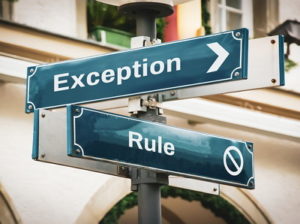 For those that like football and placing a wager on it, own goals can cause mass confusion. There are some markets in which own goals count and others in which they do not. Understanding the difference between them can help you ensure that you don’t misunderstand why you have or haven’t been paid out on a bet that you thought was a winner. Sometimes, of course, you might think that your bet was a loser, only to be pleasantly surprised to find out that it wasn’t, all thanks to the rules around own goals.
For those that like football and placing a wager on it, own goals can cause mass confusion. There are some markets in which own goals count and others in which they do not. Understanding the difference between them can help you ensure that you don’t misunderstand why you have or haven’t been paid out on a bet that you thought was a winner. Sometimes, of course, you might think that your bet was a loser, only to be pleasantly surprised to find out that it wasn’t, all thanks to the rules around own goals.
In essence, the key thing to think about when it comes to own goals is what the goal is influencing. If the goal is influencing a bet in which the scorer doesn’t matter, it will count. This means that the likes of Correct Score or 1X2 bets will include own goals when they’re being settled. If, on the other hand, it is something where the scorer matters, own goals won’t be included. In other words, a First Goalscorer bet won’t be influenced by the first goal in a game being an own goal, but a Correct Score wager of 1-0 will include it.
The Bets Own Goals Count In
 Let us start by directly answering the original question of the page. The wagers that own goals count in are those in which it is irrelevant who scored the goal, only that a goal has been scored. This means that wagers such as Both Teams To Score will include own goals, on account of the fact that it will change whether or not a team has a score next to its name at the conclusion of the match. A game that ends 3-2 in which all five goals were own goals will still count as a winner when it comes to Both Teams To Score bets.
Let us start by directly answering the original question of the page. The wagers that own goals count in are those in which it is irrelevant who scored the goal, only that a goal has been scored. This means that wagers such as Both Teams To Score will include own goals, on account of the fact that it will change whether or not a team has a score next to its name at the conclusion of the match. A game that ends 3-2 in which all five goals were own goals will still count as a winner when it comes to Both Teams To Score bets.
Another market in which own goals will be included is the Total Goals market. If you’ve placed a bet on there being four goals in a game and the match ends 2-2, 4-0 or 3-1, your bet will be a winner even if every single goal was scored by a player against their own team. The same is true of Over / Under bets. An own goal being scored to make the score 3-1 will see an Over 3.5 Goals wager become a winner, or an Under 3.5 Goals bet be a losing one.
Essentially, you need to try to figure out whether the identity of the goalscorer matters in order to work out whether own goals will count towards your wager. A bet on a goal being scored in the first 15 minutes of the second-half, for example, simply requires the ball to hit the back of the net, not for a particularly player to score the goal. As a result, the goal being scored by a player against their own team will still count. The same is true of the 1X2 market, sometimes referred to as Match Betting, where own goals will count.
To put it another way, a bet on the result of the match, whether that be a home win, an away win or a draw, isn’t influenced by who scores the goals. You could see that a match has ended 2-2 and need no other information to find out whether a bet on a home win would be paid out on or not. With that in mind, it is a good rule of thumb to use when trying to figure out which wagers an own goal will be counted towards: do you need any further information before knowing whether it will make a difference? If not, it probably will count.
Bets Where Own Goals Are Ignored
 The flip side of the above is that there are numerous football bets that tend to ignore own goals when they’re scored. This can be good news if you placed a relevant wagers and are concerned that it might have been a losing one as a result. The most common bet that will see own goals ignored is one placed on on the First, Last or Anytime Goalscorer. Those bets are placed with a specific person in mind and Own Goal isn’t an option. As a result, any own goals scored in a game don’t count towards such wagers.
The flip side of the above is that there are numerous football bets that tend to ignore own goals when they’re scored. This can be good news if you placed a relevant wagers and are concerned that it might have been a losing one as a result. The most common bet that will see own goals ignored is one placed on on the First, Last or Anytime Goalscorer. Those bets are placed with a specific person in mind and Own Goal isn’t an option. As a result, any own goals scored in a game don’t count towards such wagers.
This means that a bet on a player to score first is still live, even if there have been four own goals in the match prior to someone getting on the score sheet in a positive manner. The same is true of In-Play bets on the Next Goalscorer market. If a goal is scored by someone against their own team, it will not be included when deciding on the outcome of a Next Goalscorer bet. Instead, it will be as if the goal had never happened and all Next Goalscorer, Last Goalscorer or Anytime Goalscorer wagers will remain live.
That might make things seem a little bit confusing if you’ve got a bet on the Last Goalscorer. Imagine a scenario in which Liverpool are playing Tottenham Hotspur. You’ve placed a bet on Harry Kane being the Last Goalscorer and the Reds have raced into a 5-0 lead. Kane scores a consolation goal to make it 5-1, but then Liverpool go on the attack and there is a massive deflection off a Trent Alexander-Arnold shot to make it 6-1. You think you’ve lost your bet, but because of the deflection the goal goes down as an own goal.
In this instance, your Harry Kane Last Goalscorer bet is a winning one, thanks to the fact that Liverpool’s sixth goal was scored by a Tottenham player. That is presuming that no more goals are scored in the match, of course, or if they are that they are scored by Kane. When it comes to Anytime Goalscorer bets, the only thing to bear in mind is that your bet won’t count if the goal that was scored by the player that you placed your wager on was in their own net. In this instance, you won’t be paid out unless the score a goal at the correct end.
These Rules Work In Your Favour
 One thing to bear in mind when thinking about the own goals rules that bookmakers employ is that they actually work in your favour. Let us imagine that you’re placing a bet on a defender to be the First Goalscorer. The odds in this instance are usually relatively long because defenders don’t often score goals, but if bookies had to take own goals into account then the odds would drop rather dramatically. Suddenly you’re losing the value in the bet that you wanted to place, whereas an own goal being ignored is good news.
One thing to bear in mind when thinking about the own goals rules that bookmakers employ is that they actually work in your favour. Let us imagine that you’re placing a bet on a defender to be the First Goalscorer. The odds in this instance are usually relatively long because defenders don’t often score goals, but if bookies had to take own goals into account then the odds would drop rather dramatically. Suddenly you’re losing the value in the bet that you wanted to place, whereas an own goal being ignored is good news.
Similarly, own goals are usually matters or pure fortune. A defender sticks their leg out to block a cross but it takes a nasty deflection, say. Maybe a midfielder has tried to play the ball back to their goalkeeper, not realising that said goalkeeper was miles off their goal-line and the ball sails past them. Whatever the scenario, it is not good news when an own goal is scored, so the idea that you’d be able to correctly predict one happening is hugely unlikely. Rather than taking your money for own goal bets, therefore, bookies instead choose to ignore them.
What Bets Should You Place?

Just because own goals will count towards certain markets doesn’t mean that you should ignore them. Yes, it is really annoying when you’ve bet on a Correct Score of 2-2 and an own goal hits the back of the net in the 95th minute to take your bet away from you, but that doesn’t mean that you should steer clear of Correct Score bets in the future. Instead, it helps to think sensible about which wagers you can look to place where own goals might just work in your favour instead of seemingly working against you.
The most obvious example of this is in choosing to bet on No Goalscorer rather than betting on 0-0. At the time of writing, Liverpool are gearing up to play Manchester United in the Premier League. A quick look at a popular betting site shows that a bet on 0-0 would see you paid out at odds of 18/1. The same odds are offered on the No Goalscorer market, but that bet actually gives you more options. The game could finish 10-0, for example, and as long as all of the goals were own goals, your No Goalscorer wager would pay out.
A 10-0 scoreline with ten own goals would not, however, pay out on a bet placed on 0-0 because the goalscorer is irrelevant to the final scoreline. You get much more value for your bet when you consider the 0-0 Correct Score bet and the No Goalscorer market offer the same odds. Yes, it’s unlikely that an own goal will be scored and your bet will still be a loser if a player scores for their own team, but it offers you a slight bit of protection and that is worth thinking about when placing your wagers.
